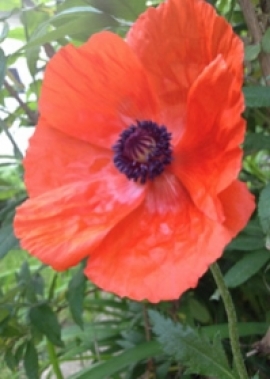What response to a 20th-century poem sparked one of the Legion family’s longest-running programs?
“We Shall Keep the Faith,” by Georgia native Moina Michael. The poem was written by the inspired teacher and YMCA volunteer in November 1918 (just before the Armistice) after she read Canadian military surgeon John McCrae’s “In Flanders Fields” – written by him, in turn, in May 1915 at the Ypres Salient in Belgium after a particularly fierce battle after which he had to perform a burial service; its title at the time was “We Shall Not Sleep.”
McCrae’s evoking of the hardy little flowers made a permanent impression on Michael. She had been at a YMCA conference when she read the poem in Ladies’ Home Journal. She showed it to attendees, stated her intention to wear red poppies in the fallen soldiers’ memory, and received $10 to buy silk poppies to distribute. Seeing the potential for a real movement of remembrance, Michael made the linking of poppies and war dead her life’s work. She went to the Legion and suggested that veterans could put together artificial poppies for both rehabilitation and money, for both themselves and assistance programs.
The poppy was made the official flower of the Legion in 1920, and of the Auxiliary in 1921. It was the Auxiliary that ran with the idea. The American Legion Auxiliary Poppy Program has been a staple of the organization ever since. The poppies are still made by disabled or hospitalized veterans, with materials provided by Auxiliary departments, and the veterans still receive a small stipend. The program serves as both a form of community awareness and a fundraiser. In 2011, nearly 3.5 million poppies were distributed by units, raising $2.1 million in donations to assist disabled and hospitalized veterans across the country. In 1930, Moina Michael was awarded the Auxiliary’s medal for distinguished service.
Although McCrae’s poem and Michael’s response cemented the link between poppies and fallen soldiers in the United States and beyond, they were not the first to make it. Fields of poppies in former battlefields were remarked on as far back as the Napoleonic Wars. The reason for the link? Papaver rhoeas, the common poppy, is a very adaptable variable annual and agricultural weed. Its “photo-dormancy” means it needs light to germinate, but thick seed walls allow it to maintain its structural integrity in soil for many years until it gets that light. When the soil is disturbed, such as in battle or by digging graves, poppies grow quickly and easily.

